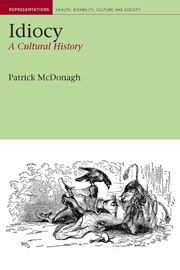Book contents
- Frontmatter
- Contents
- Preface and acknowledgements
- 1 Introduction: idiocy, culture and human relations
- 2 ‘Stripping our own hearts naked’: William Wordsworth and John Wilson read ‘The Idiot Boy’
- 3 A ‘pupil of innocent Nature!’ The wild boy of Aveyron goes to Paris
- 4 Diminished men: masculinity and idiocy
- 5 Essential women: femininity and idiocy
- 6 Holy fools, witty fools, depraved fools: folly, innocence and sin
- 7 History, society, economy: holy fools and idiots come home in nineteenth-century literature
- 8 Barnaby Rudge, idiocy and paternalism: assisting the ‘poor idiot’
- 9 Innocence, philanthropy and economics: the new ‘asylum’ idiot
- 10 Sensational idiocy
- 11 ‘The sins of the fathers’: idiocy, evolution and degeneration
- 12 Danger and degeneracy: the threat of the urban idiot
- 13 The problem of the feeble-minded: the Royal Commission, eugenics and eternal chaos
- Epilogue
- Bibliography
- Index
5 - Essential women: femininity and idiocy
- Frontmatter
- Contents
- Preface and acknowledgements
- 1 Introduction: idiocy, culture and human relations
- 2 ‘Stripping our own hearts naked’: William Wordsworth and John Wilson read ‘The Idiot Boy’
- 3 A ‘pupil of innocent Nature!’ The wild boy of Aveyron goes to Paris
- 4 Diminished men: masculinity and idiocy
- 5 Essential women: femininity and idiocy
- 6 Holy fools, witty fools, depraved fools: folly, innocence and sin
- 7 History, society, economy: holy fools and idiots come home in nineteenth-century literature
- 8 Barnaby Rudge, idiocy and paternalism: assisting the ‘poor idiot’
- 9 Innocence, philanthropy and economics: the new ‘asylum’ idiot
- 10 Sensational idiocy
- 11 ‘The sins of the fathers’: idiocy, evolution and degeneration
- 12 Danger and degeneracy: the threat of the urban idiot
- 13 The problem of the feeble-minded: the Royal Commission, eugenics and eternal chaos
- Epilogue
- Bibliography
- Index
Summary
Eugenia Tyrold, fifteen years old, is small, limps from a childhood accident and is scarred by smallpox. Among the many female characters populating Fanny Burney's 1796 novel Camilla, Eugenia is distinct in her physical unattractiveness, although she is equally distinguished by her intelligence and generosity. Sheltered by her loving family, she does not realize the disadvantages of her appearance until one day, on a public outing, she is singled out and abused by a vulgar crowd. Mortified, Eugenia tries to isolate herself from the world, until one day her father insists on taking her and her sister Camilla on an outing. They travel to meet a young woman, a ‘beautiful figure’ who, not seeing her visitors, ‘sits down upon the grass, which she plucked up by hands full, and then strewed over her fine flowing hair’; Eugenia compels herself to watch, with subdued envy, the ‘object before her, who was young, fair, of a tall and striking figure, with features delicately regular’ (308). Soon it becomes clear, though, that something is amiss with the beautiful young woman: she sobs violently, bursts into a ‘fit of loud, shrill, and discordant laughter’ and then spins on the grass ‘with a velocity that no machine could have exceeded’ (309). When the girl finally realizes she has visitors, she greets them enthusiastically, ‘while the slaver drivelled unrestrained from her mouth, rendering utterly disgusting a chin that a statuary might have wished to model’ (309).
- Type
- Chapter
- Information
- IdiocyA Cultural History, pp. 102 - 128Publisher: Liverpool University PressPrint publication year: 2008



